From The Philippine Diary Project.

This year marks the 75th anniversary of the surrender of Japan and the end of World War II in the Pacific. The Philippine Diary Project contains three unique perspectives on the final month of the conflict, from the time of the Potsdam Declaration from Berlin in July, 1945, to the landing of the Allies in Tokyo in August, 1945. They are the points of view of:
First, Leon Ma. Guerrero, journalist and diplomat, who was with the Philippine Second Republic’s embassy in Tokyo. He’d started his diary (as published, anyway) on January 1, 1945. Guerrero features prominently in the Bataan and Death March diary of his friend, Felipe Buencamino III, with whom Guerrero served in the Intelligence Section of the Philippine Army. After the fall of Bataan, Guerrero went on to continue in propaganda, this time, on behalf of the Japanese, maintaining his pen name of Ignacio Javier. He would go on to join the embassy established by Jorge Vargas in Tokyo. A lawyer, diplomat, and former journalist, Guerrero recorded events in the Japanese capital and the resort town in which diplomats had evacuated, from the privileged position of an embassy staffer, with the shrewd eye of someone who’d already had government and political experience, and a reporter’s gift for jotting down the telling detail.
Second, there is the diary of Salvador H. Laurel, the son of Japanese Occupation-sponsored President Jose P. Laurel, who was with his father in exile in Nara, Japan; his father had assigned him to keep a diary from the start of their evacuation from Manila to Baguio in December, 1944, and then on to their flight into exile in Japan. He combines the perspective of a young man and someone in the unique position of being able to observe the dying moments of his father’s regime.
Third, writing in Iwahig Penal Colony in Palawan, there is the diary of Antonio de las Alas, who had been Minister of Finance in the Laurel government, a fixture in the prewar government (having served in the Quezon government and, at the oubreak of the war, he had just been elected to the senate), and who was under Allied detention for collaborating with the Japanese. His is a senior government official’s perspective, familiar with both the Americans and the Japanese, and observing the changes in affiliations and alliances as senior officials like himself went into eclipse.
Our story begins in mid-July, with the meeting of the “Big Three”—Winston Churchill, Harry S. Truman, and Joseph Stalin—in the capital of defeated Germany: in a suburb of Berlin called Potsdam, to be exact.
The Potsdam Conference was the follow-up to the Yalta Conference, where Franklin D. Roosevelt, Winston Churchill, and Joseph Stalin had agreed that three months after the defeat of Germany, Russia would join the United States and Great Britain in waging war against Japan. Russia had maintained neutrality in the Pacific War, but the Western Allies, concerned about the expected immense casualties that an invasion of Japan would cost, wanted Russia to join the fight.
In the meantime, also because of the anticipated great cost in lives of a Japanese invasion, the United States had pursued the Manhattan Project and Harry S. Truman had authorized the use of the atom bomb against Japan.
On July 16, 1945, the atomic bomb had been successfully tested in New Mexico: Truman informed Churchill and Stalin of this fact in Potsdam the next day, July 17.
What follows contains day headings in italics come from The Last Days of Imperial Japan 1945 to 1951. Day information in underlined italics comes from World War II in the Pacific: Timeline of Events 1941-1945, while the days also feature the front page of Free Philippines, the newspaper put out by the Office of War Information of the U.S. Army in the Philippines.
A quick summary of how the focus of events had shifted to the looming task of planning “Operation Olympic”—the expected invasion of Japan in 1946:
July 5, 1945 – Liberation of Philippines declared.
July 10, 1945 – 1,000 bomber raids against Japan begin.
July 14, 1945 – The first U.S. Naval bombardment of Japanese home islands.
July 16, 1945 – First Atomic Bomb is successfully tested in the U.S.
July 26, 1945: The Potsdam Declaration
On this day, Components of the Atomic Bomb “Little Boy” are unloaded at Tinian Island in the South Pacific.
The Potsdam Declaration was a final warning to Japan issued on July 26, 1945 issued by the United States, Great Britain, and China.
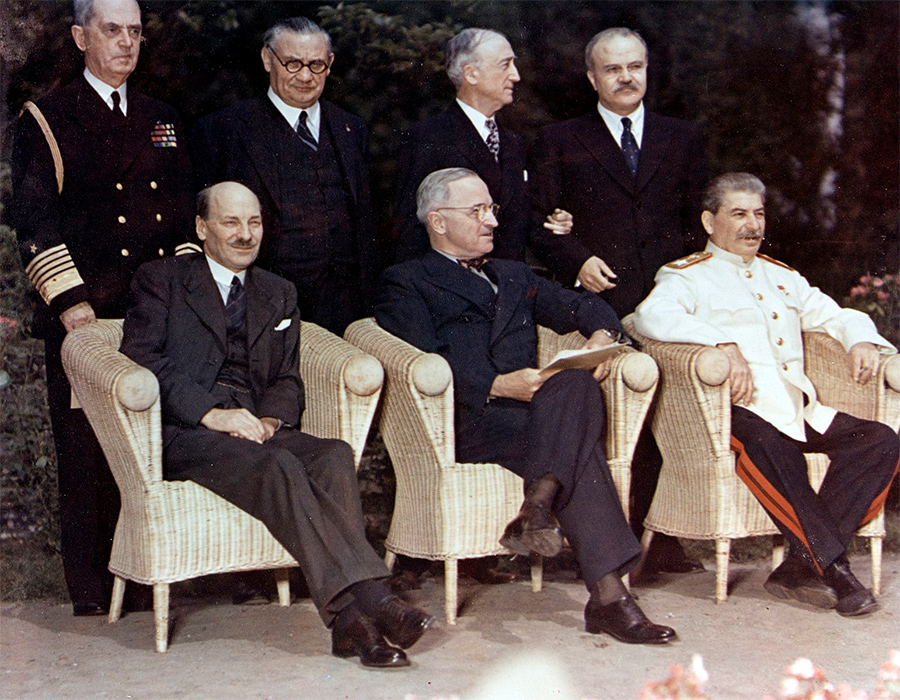
In his diary (because of the international date line), Leon Ma. Guerrero wasn’t yet aware of this; but his entry provides a snapshot of Japanese official posturing on the eve of what would mark the start of the end game for Japan. His entry is a masterpiece of sarcastic bemusement:
The Japanese learned “with trepidation” today that while the American task force is searing the imperial land with fire and steel, the emperor “is graciously engaged in state affairs, in high spirits despite his work.” Due to the destruction of the imperial palace “His Majesty is experiencing more inconveniences than before but he has had the graciousnesss to attend to state affairs in excellent health.”
The president of the board of information, who transmitted these facts at the inaugural meeting of branch-chiefs of the Dai Nippon Political Association, also recalled an anecdote on the emperor’s grandfather. When the great Prince Ito submitted his resignation as premier, the equally great Meiji answered with a sigh: “Alas, We cannot resign.”
Yesterday the Asahi also reported on the state of the Premier’s health. It seems that despite his advanced age (he will soon be 80), Suzuki is “rosy-cheeked and radiating health.” He has not been sick once in the four months since he took office. At that time an old shipmate, a retired navy doctor, had rushed up to Tokyo from Okayama and had appointed himself the new prime minister’s physician. He was now “thoroughly disgusted”; he had nothing to do. The old man’s blood pressure was 169; his weight had fallen off a bit from 22 to 20 kan (one kan equals 3.75 kilos or 6.23 pounds) but he had not suffered from it.
The secret of the premier’s health, it developed, was sleep; he slept at least 10 hours a day, retiring ay about 10 p.m. Not even an air-raid could make him lose his “precious sleep”. He received no visitors in the mornings, spending them “in speculation and thought”. For recreation he had a small garden; an inveterate smoker he had cut himself down to two cigars a day, since taking office and had allowed himself half a [illegible] each day. (one [illegible] equals 1.[illegible] liters).
An avid reader, he had lost his entire library in a fire-raid. But a grandson had found him a copy of the works of Laotsze in a second-hand bookstall and had pointed out a passage in this work which he considered the secret, not only of his administration, but of life itself. The passage: “The way to govern a great country is the same as to cook small fish. Cooking the fish quickly or over too strong a fire, breaks it up and spoils it. Whatever you do, do it slowly and well.
In the imperial cities along the storied rivers, in the startled villages of the northern coast, in the factory towns on the fabled highway of the Tokaido, by Inland Sea and the ravaged shores of Kyushu, while His Majesty graciously and in high spirits attended to state affairs and his prime minister dozed in the morning sunlight, drowsy with speculation, the flames were burning too quickly and the fire was too strong.
July 27, 1945
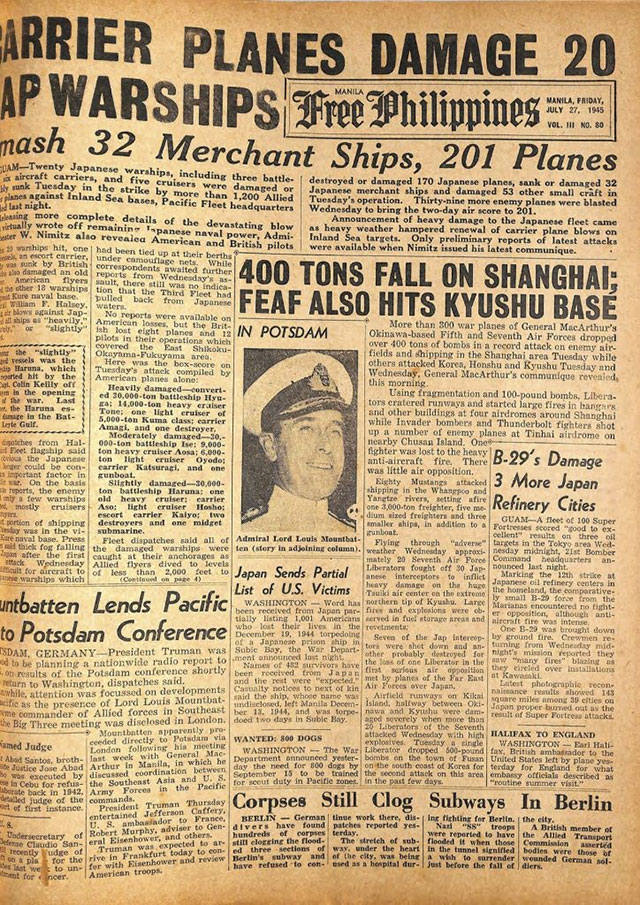
Later that day, an extra edition appeared carrying news of the Potsdam declaration:
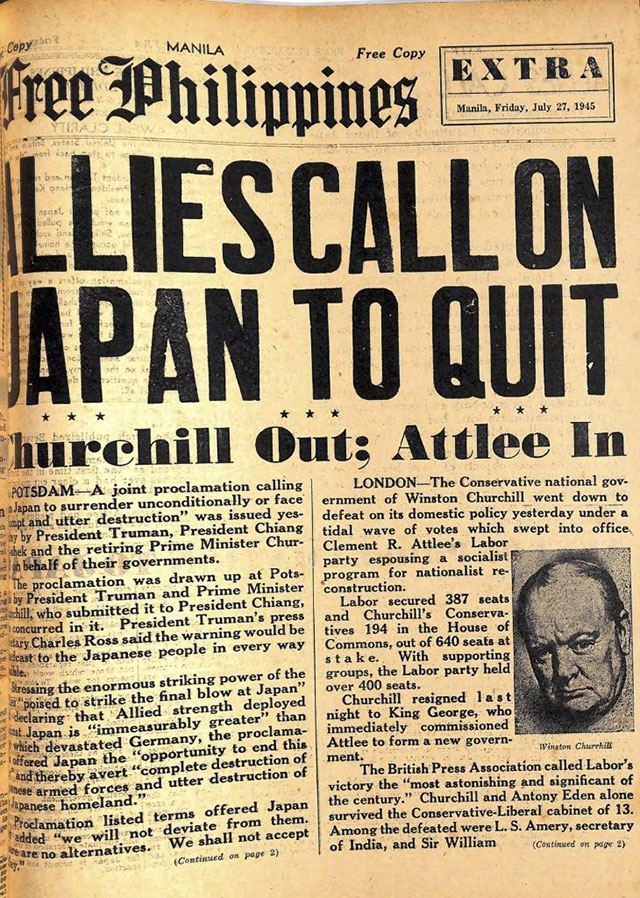
In his diary, Leon Ma. Guerrero records how it was an unusually beautiful day; and then, the news of the Allied ultimatum was hinted at:
It was a lovely day in Tokyo today; the sky was a limpid blue, bright and lively with clear sunlight. It was cool for July; agricultural weather experts were worrying in the Times about the young rice. The temperature had not gone higher than 15 degrees; it was really March or early April weather; and the growing rice liked a little warmer sun. But the school-girls in their vegetable patches on the crest of Kudan hill were giggling and pushing one another, their voices high and fresh. A couple of soldiers from the barracks nearby were running after a stray pig; it was a small scrawny pig but it was tricky and elusive and the soldiers, clumsy and ungainly in their new yellow boots, stumbled amid the wreckage of a bandstand with loud excited laughs. In the wide formal park of the Yasukuni shrine visitors from the provinces were eating their lunches under the quiet trees. There was also a group of army clerks stretched silently on the grass. From the foot of the hill came the whine and clatter of streetcars toiling up the slope. It was a pleasant grateful lull in the fortnight of alarms; and the people of Tokyo, the grimy housewives gossiping in the ration queues, the thoughtful students dangling frayed white towels at their belts, the stumbling babies picking at their sores, the clerks and policemen, the technical majors and pathetic drabs, all wrapped in that curious and uniquely Japanese smell of pickled radish, cheap pomade, and soya bean sauce, were chatting and dozing in the sunlight wherever they could find it.
It seemed impertinent to note these things because in a distant German city, one day and half-a-world away, the powers at the gates had announced an ultimatum to Japan. The Tokyo papers hinted at it in subtle innuendoes. A delayed dispatch intercepted by Domei threatened that “immediately following the termination of the Potsdam conference, the Soviet Union, the U.S.A. and Britain are reported to have decided to make a vital joint proposal to Japan. They had no short-wave radios so they did not know but even as they sat in the sweet summer sunlight, the air above these dreamy people of Tokyo was vibrant with a last demand for unconditional surrender. Doubtless in the hidden halls and palaces the warlords were pondering on this message; perhaps even now the ministers of His Imperial Majesty studied one another’s faces with jealousy and suspicion as they debated what course could put the imperial mind at ease. But for this one miraculously peaceful day the mind of the common man in Tokyo was already at ease, in the soothing warmth beside the golden carp that swam silently in the depths of the imperial moats.
July 28, 1945
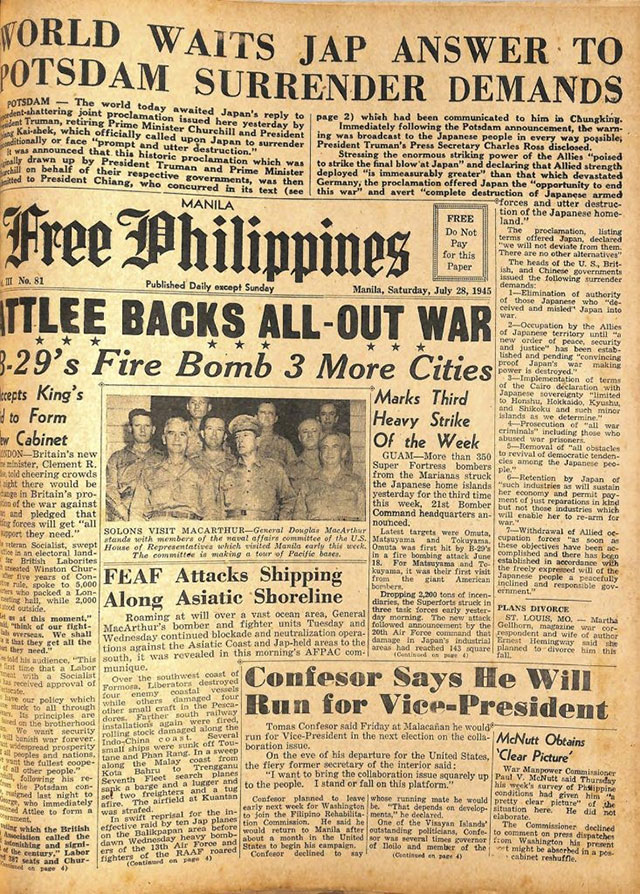
Tokyo’s dreamful lull did not last long. This morning about 240 P-51’s, led by several B-29’s, raided the Kanto district while some 600 carrier-borne planes were raking Central Japan. Life was once again hurried, stern, tense with dire warning and desperate decision.
July 29, 1945
Japan will ignore the Potsdam declaration. It develops that Foreign Minister Togo reported its contents to the cabinet at its regular meeting on the 28th and that the Japanese government would “say nothing on it.” No one else had anything to say on it. The Mainichi said the proposal was “most insolent” and “based on self-conceit” but neither in its own nor in the other editorial columns was there another word of condemnation, rejection, or challenge…
The mere fact the ultimatum has not been scorned and excoriated outright in the familiar terms of arrogance, contempt, and outraged defiance, betrays the faltering hand, the breaking nerve. The terms, as published, are hard: a naked, prostrate Japan penned up in her rocky islands, a beggar under guard; for the warlords and sealords, disgrace and an unknown punishment. But the alternative is suicide like Germany’s.
It is an electric silence. A decision has not been made by the pale brooding men who must make it or, if it has been made, the words have not been found to announce it. How should ruin be announced? How can suicide be made palatable?
July 30, 1945
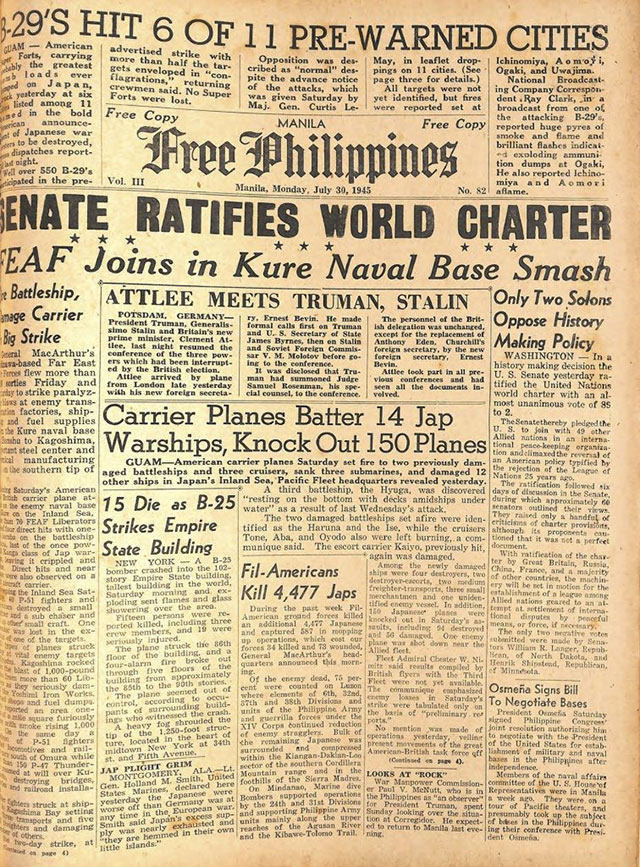
From his diplomatic perch in Tokyo, Leon Ma. Guerrero observed the Japanese government trying to remain defiant; but he noted how this defiance was in the face of a very obvious ramping-up of the Allied bombing effort:
Can the Japanese government continue to “ignore” the three waves of carrier-borne planes that attacked the Kanto this morning, or the fleet that shelled Kamamatsu and the Kii peninsula last night, or the 500 B-29’s that set ablaze another constellation of cities on the night before? Pursued by these inexorable facts the generals and admirals must throw behind them a scrap of mendacity, a cheap and flashing trinket of bravado, to amuse and delay the hounds.
The Premier Admiral Baron, waving aside the Potsdam ultimatum as a mere rehash of the Cairo declaration, told the press last night that he was still “firmly convinced of final victory in the decisive battle.” But these were already frayed and shoddy words, their meaning faded by constant use; they were the small change of politics; the feeling remained that they were being traded for time while the big deal was being worked out. Potsdam is a long way from Cairo, as far as Saipan from Okinawa. Tozyo had never seen a B-29 over Tokyo; now Suzuki was talking to the press in his official residence, and not to a scheduled mammoth rally in Hibiya hall, because carrier-planes from a task-force at the coast of Japan had driven him to cover.
Nevertheless the old man had managed to ignore the postponement of his first public appearance as an orator and to reassure as best he could the proxies of his audience. After long delays, he announced, the construction of underground factories had finally been started. “Unusual endeavors are being made in that direction and great expectations can be had for its progress.”
Of course, he admitted, “it is but natural that during the period of transportation of machinery, production should fail to reach the desired figure.” But “efficiency was mounting”. The laborers, men and women, were working 16 hours a day “in absolutely safe areas and in perfect peace of mind. From time to time they were take outdoors and given physical exercise. The air in the tunnels was “not so injurious to health,” he had been told.
At any rate he had made several inspection trips and had found the number of underground factories on the increase. At one such factory “several hundred airplanes” were being turned out every month. The exact figures were secret but “the number is not so small as people may think.” “The other day,” recounted Suzuki,”a certain airman asked me how many hundreds of airplanes were being turned out a month. I said: ‘Why how many hundreds? It is not a question of hundreds but thousands!’”
In case this was not sufficient to distract the people from the deadly dilemma that confronted the country, the General President of the Great Japan Political Association, Jiro Minami, dangled another ambiguous and noncommittal red herring. “It is clear” he told the press, “that a complex intrigue underlies this (Potsdam) declaration. That is most clear in that the enemy is trying to allay war weariness in his own camp and trying to foster as desire for peace in ours.”
Perhaps he was reading his own fears and apprehensions into the designs of others.
He added a story told by a Japanese military police (Kempeitai) officer to the Philippine ambassador, Jorge B. Vargas:
A kempei captain told Vargas today that in his own limited district in Tokyo alone an average of two Japanese spies are being arrested daily. What was more portentious even than their existence was their motive. Usually they were fumbling amateurs with no means of transmitting the military information they had secured or hoped to secure. They were merely “investing” in it; hoarding it for the day when they might trade it for some measure of safety or advantage from the conquering invader.
August 1, 1945
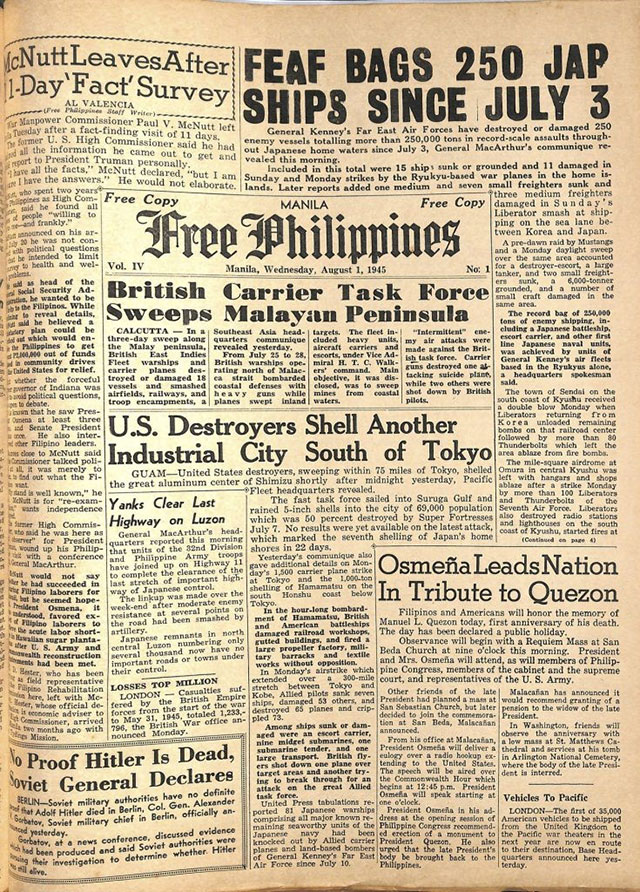
Carefully reading the papers for signs of official intentions, in Tokyo, Leon Ma. Guerrero writes that he detects a change in the Japanese posture, towards an openness to a negotiated peace:
The shadowy outlines and decision on the Potsdam Declaration may perhaps be seen in a Domei comment carried inconspicuously in an inside page of the Times today…
There is a faintly exploratory air in this analysis that underlines recent trends. The language is not violent; it is cautious and tentative. The American government, it seems to say, is not having an easy time of it (an echo of Kurihara); it is ready to bargain. The Potsdam declaration, furthermore, is not really an ultimatum; it is a show-piece for home consumption; it is a shrewd trader’s first offer; it can be jewed down. But what can Japan bargain with? It can bargain with its power and will to continue; a bloody resistance, ultimately suicidal and futile it may be true, but one that will require such heavy sacrifices that the Americans, impatient to end the war, frightened by mounting casualties, will be glad to avoid it by a reasonable arrangement.
Into this vague pattern the scattered hints and insinuations of the past few days fit readily. Suzuki’s underground factories and “thousands of planes”, Minami’s “complex intrigue”, the poised and silent watchfulness of the editors, take their places in the still sketchy picture of a deal, to be sprung at the proper time on the simple honest people who are even now preparing to die.
He then attended a Buddhist rally, and in the end, decided to leave early:
I felt this uneasy curiosity following me to a Buddhist rally at the Imperial Hotel for which invitations had been received at the embassy. It turned out to be for the purpose of passing a declaration on behalf of the 50 million Japanese Buddhists. A small banquet room had been arranged hastily as a hall-oratorium. Rows of chairs filled the center of the apartment while along the windows were arranged the heavy overstuffed lounging armchairs with which the place must have been originally furnished. There was an air of hasty improvisation, and perfunctory duty about the whole thing.
It was odd enough in itself that these shaven-skulled monks and gossipy old deacons about me should have been chosen to reaffirm Japan’s will to fight at this desperate crisis. It occurred to me that possibly it was because they could be trusted to speak more credibly and naturally in the gentle accents of sweet reasonableness. The warlords had eaten enough fire.
A couple of quietly dressed and elderly gentlemen were passing around programs and copies of the proposed declaration…
How meek and mild and ineffectual did these men look, their hands folded on their laps, their eyes on the frayed carpet. They looked so bewildered. What calculations of high state politics had called them from their sutras and their rosaries to drown with their mumbling prayers the clang of broken swords
Foreign Minister Togo was present, as pious as the rest. He looked old and weary; hid phrases were perfunctory; and he hastened away immediately after speaking. The minister of education and the president of the board of information followed; the latter droned on and on for what seemed to be hours.
I could stand it no longer. I was going to tiptoe out. To a colleague I whispered that if any word was asked from our side he could rise and assure the congregation that “all the Filipino Buddhists were heartily behind the declaration.” There are of course no Filipino Buddhists.
For his part, a former member of the government (now in exile) which Guerrero still represented, Antonio de las Alas, reflected on the past. But he did receive some news, days late:
On this day, Wednesday, August 1, 1945, we read that at Potsdam, Germany, Truman, Stalin and Attlee (the new Premier of Great Britain), and with the concurrence of Chiang Kai Shek, sent an ultimatum to Japan demanding surrender. The conditions imposed were that Japan is to have only her four original islands. All lands taken by force must be returned.
August 2, 1945
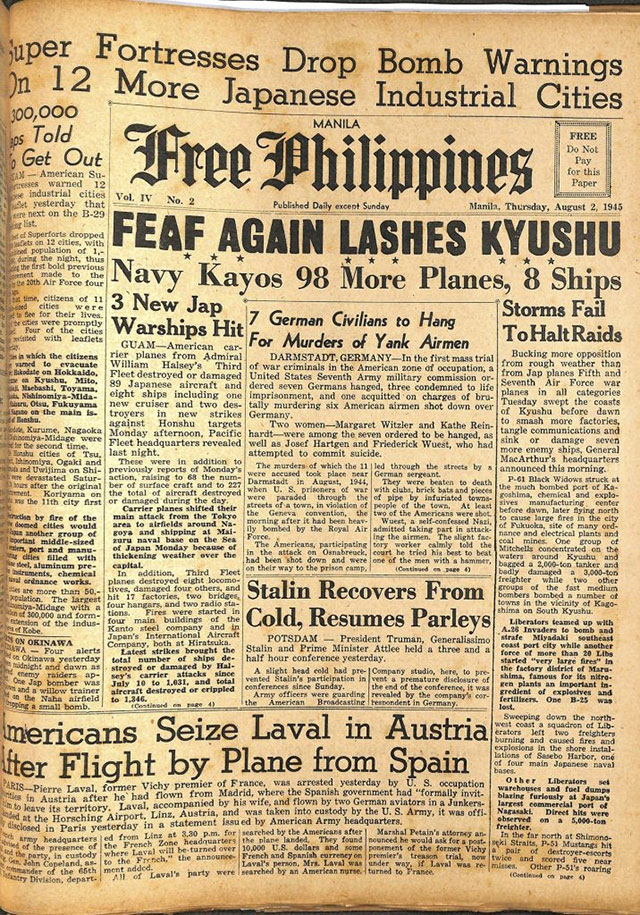
In Tokyo, Leon Ma. Guerrero noted that Japan finally gave a reply to the Potsdam Declaration:
The warlords gave Japan’s answer to the Potsdam ultimatum at 5 p.m. yesterday. A special communique from imperial headquarters announced that “our army and navy preparations to cope with the enemy’s invasion operations are being steadily strengthened.” The somber implication is that Japan will fight to the end.
But he believed this was posturing:
However the furtive hope of a bargain is not necessarily dismissed. The communique, in going on to summarize losses allegedly inflicted on the Americans last month, may have intended to define Japan’s bargaining position. Admitting “fairly great damage” to cities, factories, aircraft and vessels, and “damage” to air bases and military facilities, IJN claimed having show down 43 large planes (including 29 B-29’s) and 175 carrier-borne planes. In the Okinawa area, from January to July 31, two carriers, one cruiser or destroyer, two destroyers, two transports, and three other warcraft, were claimed sunk.
Japanese submarines, it was also alleged, had sunk two transports while three American submarines had been destroyed. Even admitting Daihonei’s figures the totals were not such as to terrify the Americans. Last night more than 500 B-29’s were again over Japan.
But it’s important to note, in light of what was to follow, that at this point, the Japanese still believed they could drive a hard bargain by actively resisting an expected Allied invasion:
Nevertheless the choice seems to have been made. If the Americans persist in the Potsdam declaration which, according to the Mainichi today, “goes much further than what an ordinary victory would entitle a party to in war,” then the Japanese will “steadily strengthen” their preparations against invasion. On the other hand an unspoken alternative remains: if the Americans wish to spare themselves the sacrifices of an invasion, then they might content themselves with the fruits of an “ordinary victory”, whatever that may be.
He closed his entry with an enlightening conversation:
Wondering once again how the Japanese felt about this choice that had been thrust upon them, I remembered a conversation with a young Japanese diplomat a month ago. We had been chatting over a midnight cup of bitter yellow tea in a narrow hotel room and it was almost time for bed. I had not seen him for more than a year and we had had many things to talk about.
On an impulse I asked him: “What do you think of the war?”
“I think we have lost it,” he answered.
“So you would be in favor of Japan making peace?”
“No,” he replied unexpectedly.
But if Japan has lost the war, I expostulated, what was the use of fighting on?
He studied me quizzically, a good-looking young man with black hair brushed back neatly.“Oh, I see,” I fished. “You believe in bargaining, in fighting on for better terms.”
He gave a deep chuckle. “No, that is what the army is doing. That is what they have been doing for the past two years. No, I want the war to continue because the people haven’t suffered enough.”“Not enough?” I protested.
“Not enough,” he said with a gesture of inexhorability. “Let them suffer. Let them learn what it is to start a war. Let them learn so hard that they will never start another war. Then we Japanese will really have something. We will be ready then to kick out these army bastards and build a good Japan.”
He made sense to me then, good hard cruel sense. Sometimes he still does.
August 3, 1945
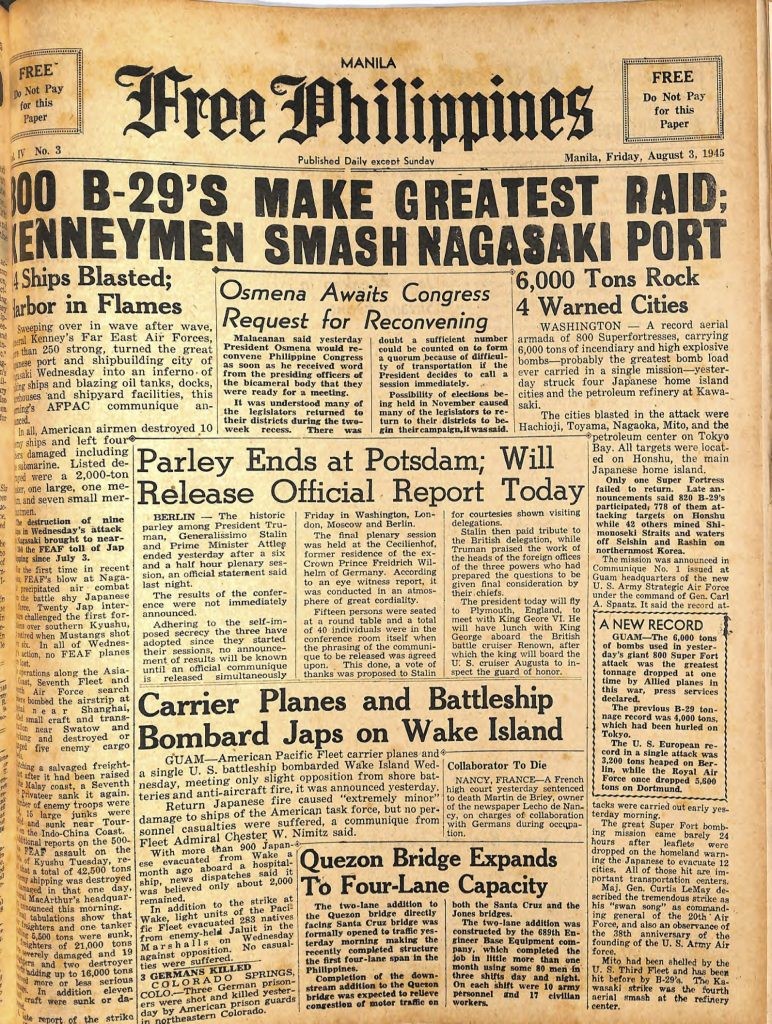
Once again, Leon Ma. Guerrero provides a snapshot of a Tokyo –and Japan– committed to expecting a massive Allied invasion:
In this breathing-spell before invasion, it is strange, looking around, to see how imperceptibly and yet how inevitably these people and their country, through the small gradual deteriorations of every day, have come to the edge of the pit. One scarcely notices from one week to another, even from one month to the next, how greatly things have changed; how one almost never sees a pretty girl anymore these days; how tired and red-eyed the men are in the trains, the choking trains where shabby bristly men fall asleep on the shoulders of the stranger next to them; how one has grown not to expect the fish and vegetable rations, how many smokers wait patiently for a fortunate passerby to strike a rare matchstick.
But it is a society deeply hungry, even as every able-bodied citizen receives summons to join fighting units:I note at random that the wife of a German I know surreptitiously eats handfuls of pine-needles from the hotel garden “because they are full of vitamins, you know”; that a pound of butter costs 120 yen; that one can get a hand-knitted sweater for five tins of jam or marmalade; that one excellent American noiseless portable typewriter is being offered for 2,000 cigarettes; that a marquis and a viscount, prosecuted for smuggling out platinum, have returned their titles; that street-vendors in Tokyo have been ordered to take shelter even during a precautionary alarm because of the single raider that dropped a bomb midtown the other day; that, possibly for the same reason, the long queues before the movie houses have disappeared.
Meanwhile, the air attacks from Allied bombers continued to increase:
…Step by step, one gets used to things from which a year ago, the Japanese would have shrunk with repugnance: living in a damp trench under a sheet of rust iron; drinking peanut juice “as white as milk”; sleeping uneasily in their working clothes. If the warlords’ bargain falls through, they can all presumably accustom themselves permanently to being dead.
August 4, 1945
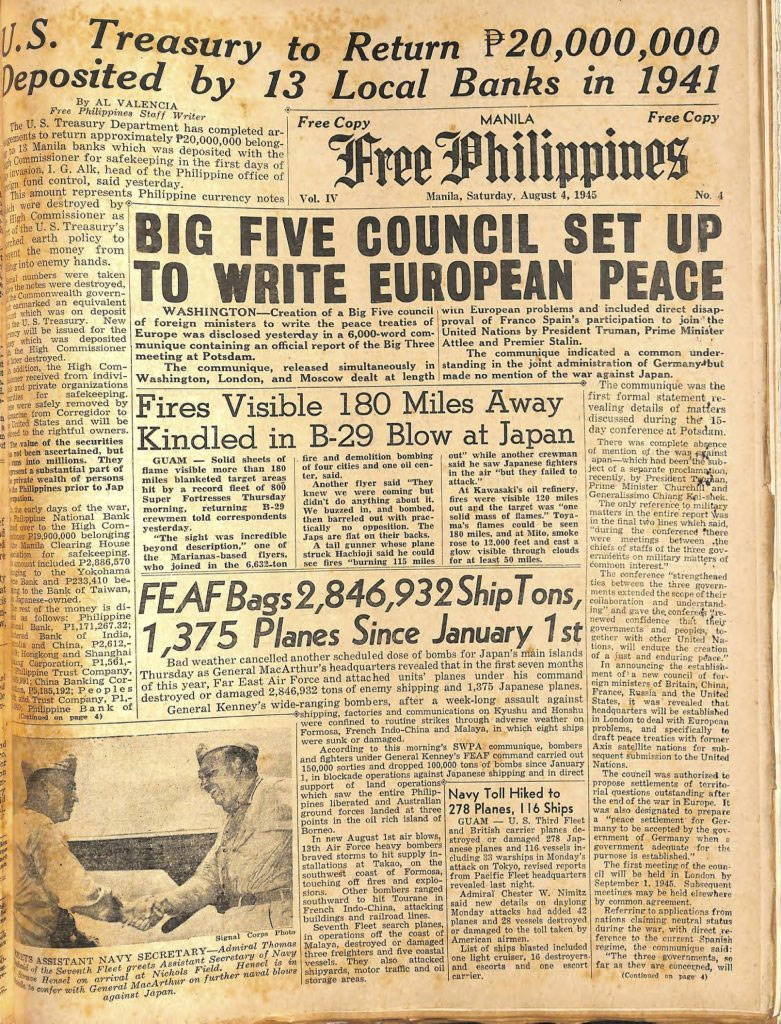
Leon Ma. Guerrero recounts the experiences of a population subjected to constant air-raids:
A number of Filipino students were returning home the other day when their train was strafed. An Indonesian with them was killed outright by a bullet through the head; one of the Filipinos was hit in the arms and thigh and may have to undergo an amputation.
Two of our other students were luckier. Coming back from the south they were under constant air-attack but escaped injury, once by diving under the wheels of their railway carriage. Railways and ferries were in total confusion, they reported. The trains were crawling by fits and starts through a land in flames or in ruins.
August 6, 1945: First Atomic Bomb dropped on Hiroshima from a B-29 flown by Col. Paul Tibbets
After leading off its Potsdam story two days ago with the observation that the Big Three “failed to produce anything that has direct bearing on the war in the Pacific”, the [Japan] Times today front pages the British foreign office statement on the war against Japan, including the official comment that “it is impossible to draw the inference from the communique that Russia will not enter the war against Japan.” It is the first time I have seen it openly and directly admitted in the Japanese press; so far editorialists have talked obliquely of “chance of attitude.”
August 7, 1945
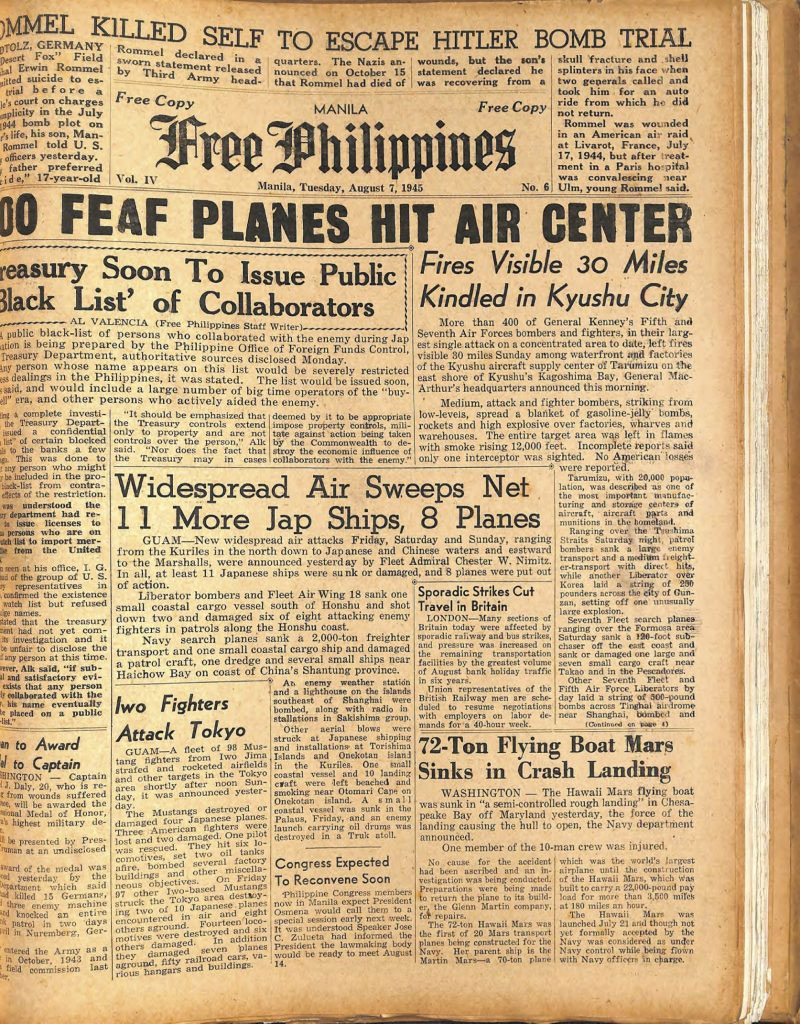
In Tokyo, Leon Ma. Guerrero recorded initial reports about the dropping of the atomic bomb on Hiroshima:
The San Francisco radio announced today that a new “atomic” bomb had been dropped on Hiroshima yesterday the 6th, wiping out 60 per cent of the city at one blow. Apparently the bomb is built on an entirely new principle, the splitting of the U-235 atom. From another viewpoint, the principle is as old as war, mass murder.
But if we do not know much about it, and do not know how much to believe of what we have heard, the ordinary Japanese knows so little that he does not even seem to care. A brief communique from imperial general headquarters, issued at 3:30 p.m. today, reads in full:“1. Due to the attack by a small number of B-29’s on the 6th August considerable damage was caused to the city of Hiroshima.
“2. In conducting the attack the enemy seems to have used new-type bombs. Details are now under investigation.”
Just as interesting was his analysis of the seeming indifference of the Japanese public to the news:
The man in the street cannot be blamed if he sees nothing particularly alarming about that. “Considerable damage” is several notches above the usual “negligible”, “very slight”, and “slight” but it is still below the occasional “heavy”. “New-type bombs” is vaguely disquieting but the Japanese are still sufficiently naive, scientifically speaking, to take even the splitting of the atom for granted. It is a curious novelty, like an electric torch, but these things are always happening in the strange surprising world of modern times. What will these “new-type bombs” do? We are forbidden of course to discuss with the Japanese the information we receive by short-wave. But I could not resist asking the boy who mops out our bathroom the same question: what did he think these “new-type bombs” were like? He shrugged his shoulders. He had not thought too much about it. Then, head cocked to one side like a little bird, he said: “Well, maybe they kill a hundred people instead of 10 or maybe they burn concrete houses like wood. I don’t know.” He bowed and sidled out, leaving me to wonder if he cared at all.
August 8, 1945: The Soviet Union declares war on Japan
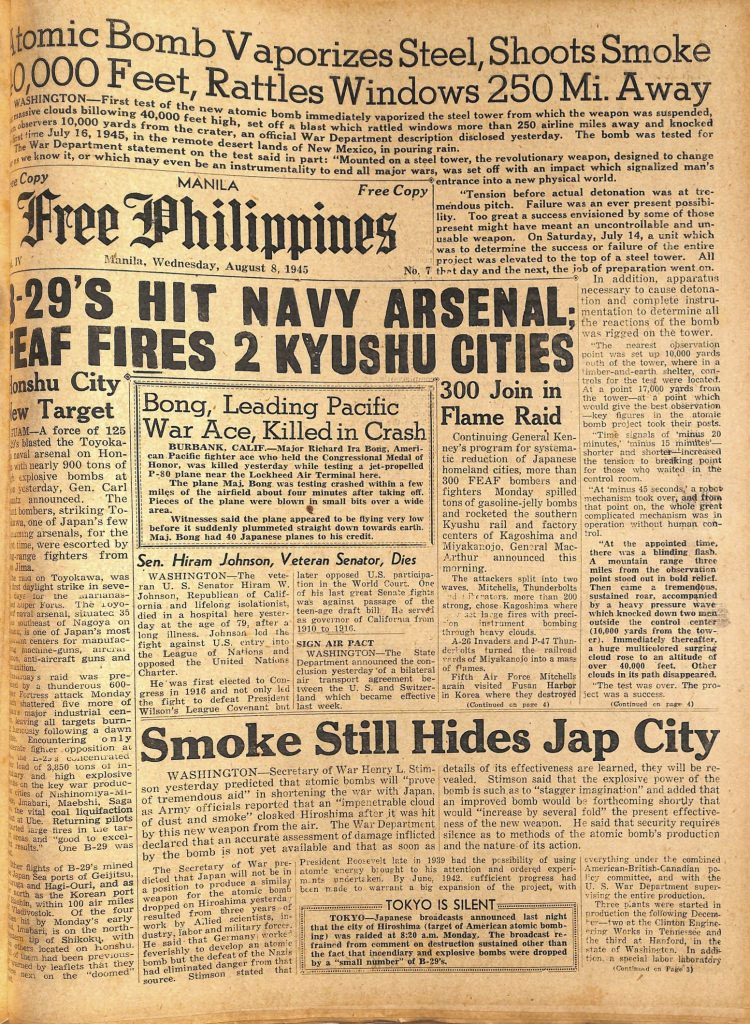
The details of the new bomb are still “under investigation”. One feels that the authorities are just an puzzled and bewildered by the whole thing as anybody else; they are certainly withholding the extent of the damage but do they know any more than the average man about the nature of its cause? was it one bomb or several? Was it an incendiary bomb, an explosive, a combination of both?
The first accounts in the local press are cautious…
The Americans have announced that leaflets have already been dropped warning the Japanese of the new bomb’s unprecedented destructive power and the Asahi ends its story by calling on the people “not to be misguided”. Perhaps in preparation for an official declaration on the bomb the Times today, which has not yet carried a story on Hiroshima..
After extensively quoting Japanese editorials on the differences between the West and the East in making war, Guerrero reflects,
There is an exasperating emptiness to these eloquent and elegantly-balanced phrases. It is like listening to a professor belaboring a syllogism while the classroom burns. The man is splitting hairs when a bomb is splitting atoms. Perhaps a year of a hundred years from now philosophers and historians will have the perspective to weigh the relative values of Western science and Oriental spirit. Right now we are more interested in what will happen to us, whether it is safe to take the train to Tokyo tomorrow, whether the new bomb will poison water, whether peace will come.
I know I should be thinking of the implications of a bomb that can wipe out two-thirds of a great city at one fell stroke but somehow the mind refuses to pick up the problem and it lies at my feet ticking with a quiet insistence. The question of peace is the farthest that the mind will reach. Some say: “It’s over. The Japs will have to give up.” Others are not so sure. They mumble about exaggerated propaganda or they cry in despair that the Japanese are crazy; they will die rather than surrender. To them the measured cadences of the Times editorial today have the sinister sound of a man walking to the gallows.
Yes, the Japanese will stick it out, they say. They will burn in their cities, disappear in a sickening flash, and then the gaunt roasted survivors will dig in, in the caves and crevices of mountains, by a last lonely beach…
Back in Iwahig, Antonio de las Alas reflected on the other historic development of recent days: the defeat of Winston Churchill in the recent British elections:
We learned of the defeat of Premier Churchill of Great Britain by Clement Attlee, a Laborite. Politics is certainly a most ungrateful game. It was Churchill who saved Britain. If it were not for his indomitable spirit, his determined will to fight, Britain might have succumbed. But people or the electorate is fickle. The same thing happened to great Clemenceau of France after the First World War. Wilson died disappointed because the United State Senate turned down his League of Nations.
August 9, 1945: U.S. Drops Atomic Bomb on Nagasaki; Emperor Hirohito convenes Supreme War Council; Soviets invade Manchuria
News of Nagasaki:
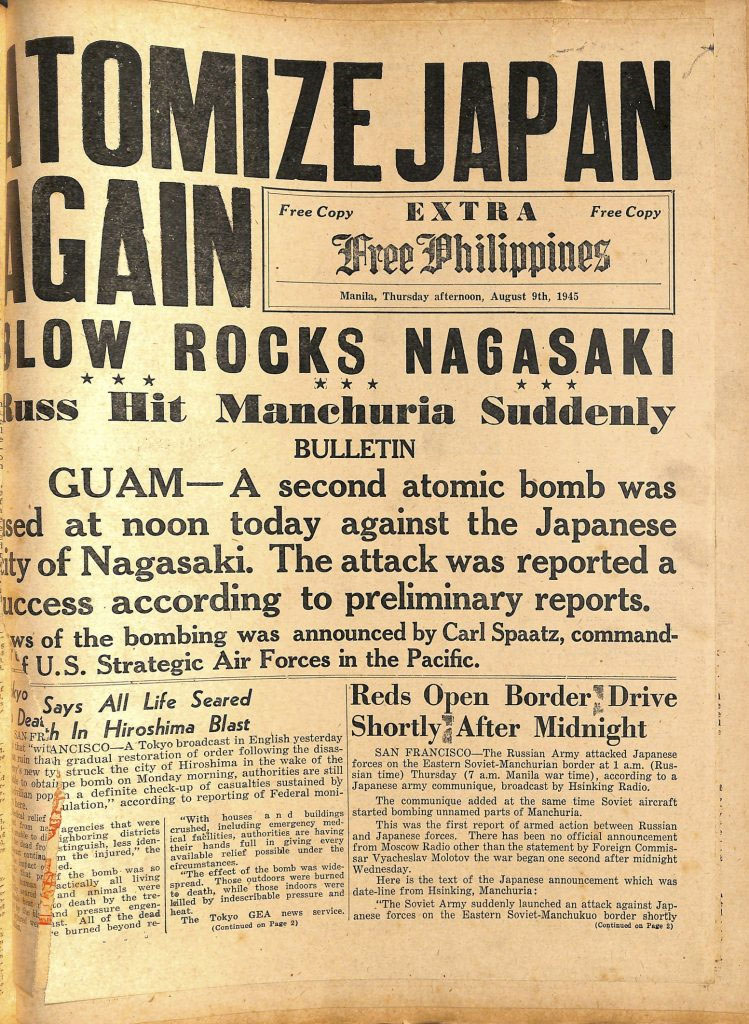
And yet another extra edition with news of the U.S.S.R. entering the war against Japan:
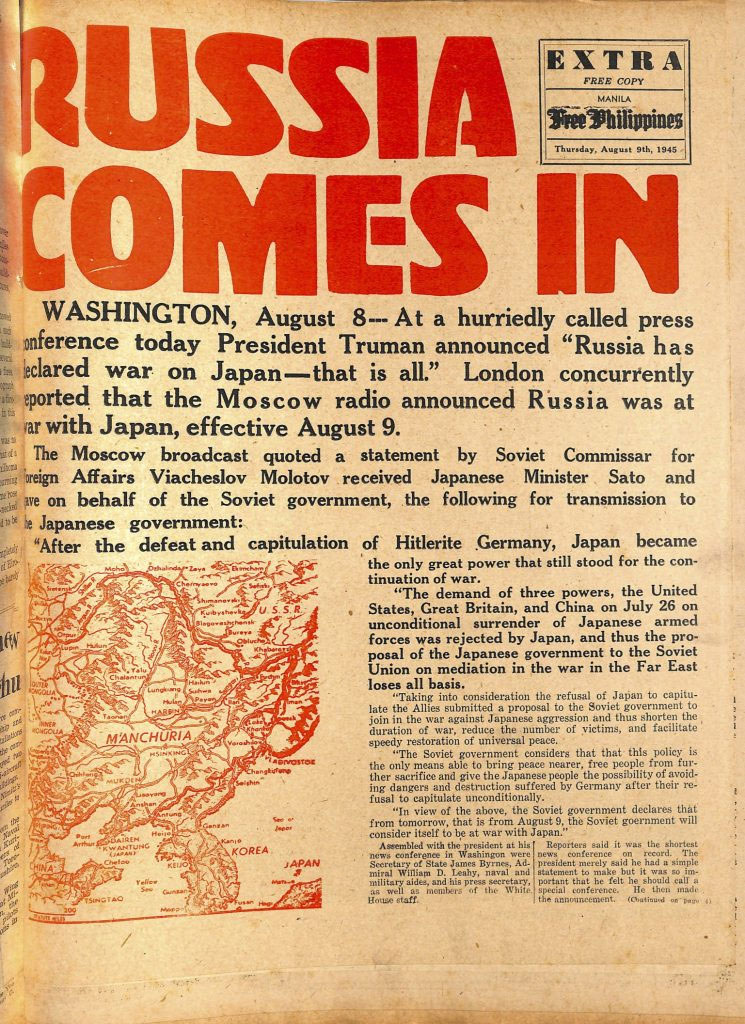
Even if far away from the center of events, the Iwahig Penal Colony was up to speed on the big news, as Antonio de las Alas recounted:
Big News. Russia declared war against Japan. This is now practically a war by the whole world against Japan. Taking into consideration the military strength of Russia, the Pacific War cannot last much longer.
For the first time the Americans dropped in Hiroshima, Japan, an atom bomb. Its destructive power is beyond classification. It is said that it is equal to bombs thrown by 2,000 superfortresses. It kills everything and lays waste an area covering a radius of seven miles.
With Russia’s entry and this new bomb, Japan will have to surrender.
For his part, Leon Ma. Guerrero, with his information from the diplomatic grapevine, knew at once of news of the dropping of a second atomic bomb on Nagasaki:
As San Francisco announced that the second “atomic” bomb had been dropped on Nagasaki shortly before noon, the vernaculars started to open up a little on the subject. It seems that “the authorities of the various government departments concerned have dispatched officials to the scene of destruction.” “According to a survey made, the new-type bomb drops toward the ground with a parachute and issues a strong light when the bomb is about 500 to 600 meters above the ground and then explodes. Simultaneous with the explosion, a large detonation is heard and a strong blast and strong heat accompany it.”
“Full caution,” warns the Asahi, “is considered necessary but it is pointed out that in case or a new-type weapon, its effects are usually exaggerated. For instance, when the V-1 made its appearance, considerable confusion and disturbance were Witnessed in England before counter-measures were devised. Upon completion of the counter-measures, the composure of the people returned.”
Guerrero then wrote in exasperation over the feeble advisory from the authorities on how to respond to the dangers of atom bombs:
What counter-measures were contemplated against this “new-type” bomb?The Asahi also published a statement of the air-defense headquarters giving directions as to the methods of defense against it…
There is almost a touch of the sinister in this stupidity. Get into a trench and pull a blanket over your head — but don’t forget to put out the fire in the kitchen! It is impossible to believe that air defense headquarters really thinks a blanket and possibly a pair of gloves can ward off the gigantic flame that dissolves an entire city. It is more reasonable to see in these “directions” a deliberate attempt to assuage the alarm of the people; if that is all that is needed, then the new~type bomb is just a bigger incendiary which burns people as well as houses. There is authentic art in that artless reminder not to forget the kitchen fire.
How long will the Japanese continue to believe it? When they learn the horrible truth, will they rise at last to cry enough or will there be anyone left to rise?
And yet, what could the authorities have said? What defense is there against this new “atomic” bomb? Tonight we were discussing heatedly the relative protection afforded by a swimming pool and a deep cave. But what was there to say? We did not even know whether the bomb killed by heat, by concussion, by radioactive radiations, by gas, or by some other terrifying mystery of dissolution. A blanket over the head seemed just as good as anything else.But there would be another bombshell, news-wise, left for that day:
Then just before dinner some of the evacuated Japanese school-children in the village ran up to a Burmese cadet with whom they had made friends. They were laughing with excitement. There was a new war. The radio, they said, had announced at five that afternoon that Soviet Russia had declared war on Japan. We flicked on the short-wave radio. San Francisco confirmed it.Somebody laughed. “We won’t have to worry about that new bomb anymore. It’s all finished.”
Late that night, the Emperor of Japan met with the Supreme War Council in an air raid shelter in the Imperial Palace grounds. The moment of final decision had come.
August 12, 1945: Emperor Hirohito orders his government to prepare a document accepting surrender
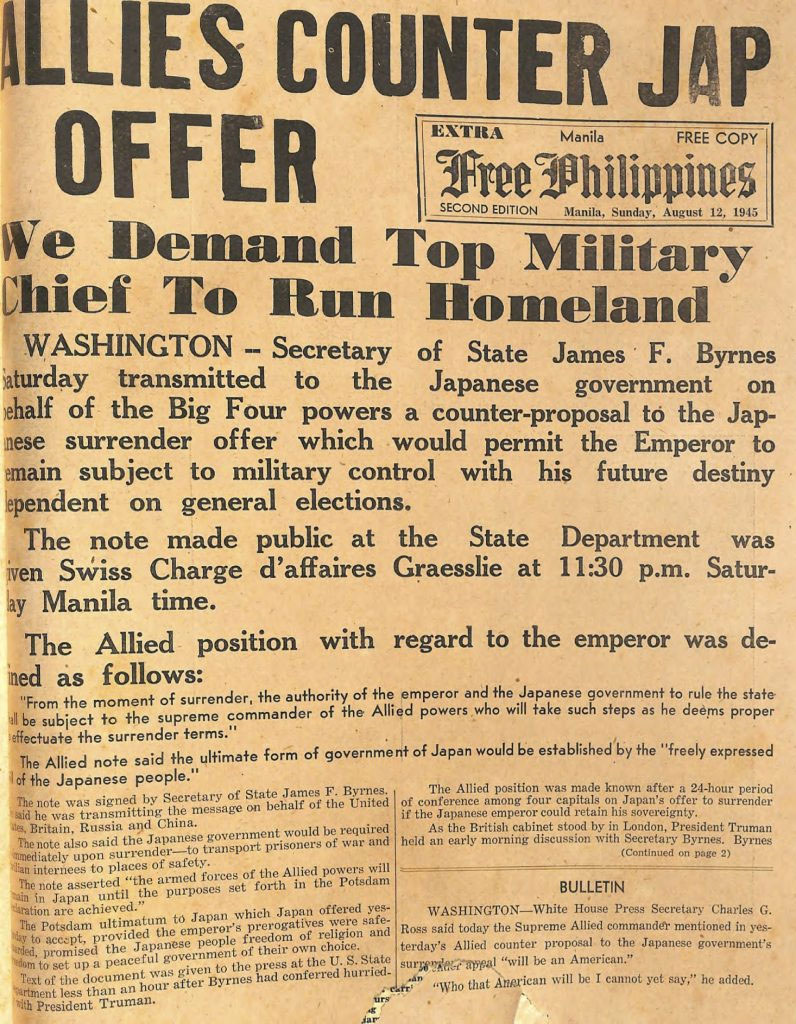
In Tokyo, Leon Ma. Guerrero recounts rumors –and the growing sense that despite the fierce rhetoric, a note of what is to come is already being sounded:
All the world knows that the Japanese are ready to surrender except the Japanese, A rumor ran through the Village today that Japan had made peace with the U.S.S.R. but it did not go further. A proclamation issued by the war minister on the 11th notified the army: “The only task before us is to fight out the holy war resolutely for the maintenance of the divine state. Even though we may eat grass, gnaw earth, and sleep on the fields, we shall definitely and resolutely fight. When we do so, I am confident, there will be life even in the midst of death.”
In the Iwahig Penal Colony, a phoned-in rumor had detainees like Antonio de las Alas celebrating the end of the war, prematurely as it turned out:
After Mass and breakfast, while I was inside our quarters, pandemonium broke out down below. Everybody was jumping and yelling, “War is over!”. We all went down to join the celebration. I noticed that everybody had tears in their eyes — probably because it meant the triumph of liberty, democracy and justice, but at the same time reminding us that we had suffered, were still suffering as a result of an injustice; probably because it meant our early liberation — we will soon be out to see our dear ones. How many nights have we spent crying, remembering the wife and children we left behind. The rejoicing continued for one hour. When all had calmed down, we inquired where the news came from. I turned out that somebody had telephoned the news to the guard and it was the latter who transmitted the news to us. This did not dampen the rejoicing, however. We were anxiously waiting for the Lieutenant because we thought that if the news were true, he would hurry to communicate the news to us since he had been showing undue interest in our welfare and liberation. When the whole day passed without the Lieutenant making an appearance, we began to doubt again. It was the first time that he did not come the whole day. But we never lost hope, we still believed it was true.
August 14, 1945: Japanese accept unconditional surrender; Gen. MacArthur is appointed to head the occupation forces in Japan
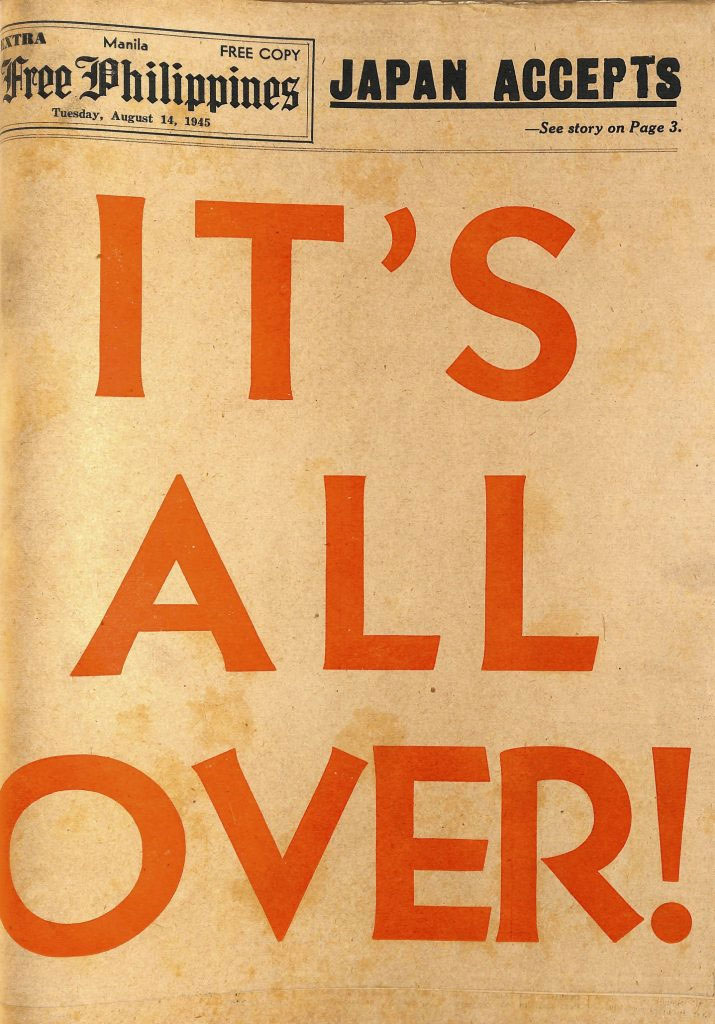
In Iwahig, in detention, Antonio de las Alas records exciting news:
FLASH!
WAR IS OVER!Japan has accepted all the terms of surrender. Now the announcement is official.
Rejoicing all around. Everybody believes that we will soon be out. I was asking myself however, “What will be the next step with reference to us?” I asked myself this question since in recent years, especially during the last months, we have experienced so many disappointments that I always fear that another one is forthcoming.
In a second entry for the day, Antonio de las Alas added,
The Lieutenant came and told us that Admiral Nimitz is now conferring with the Japanese officials, probably on the terms of the Armistice. Some consider this a blow to MacArthur as he must have been expecting that he would be the one to sign the Armistice agreement and to receive the surrender of Japan.
But in Tokyo, no news, only rumors, as Leon Ma. Guerrero recorded:
Tokyo was still silent on peace today and the rumor spread that an atomic bomb would be dropped on the capital if the American terms were not accepted by the 18th. But in all probability they will be accepted. It has been announced that the emperor will have an important message for the Japanese nation tomorrow morning. Even the Japanese in the hotel are now talking in excited whispers. Some suspect the truth; others believe the emperor will call upon all his loyal subjects to fight to the end; but most do not know what will come tomorrow. They wait with a silent submissiveness to do what they are told.
August 15, 1945: Japan Agrees to Surrender; Attempted Military Coup in Tokyo
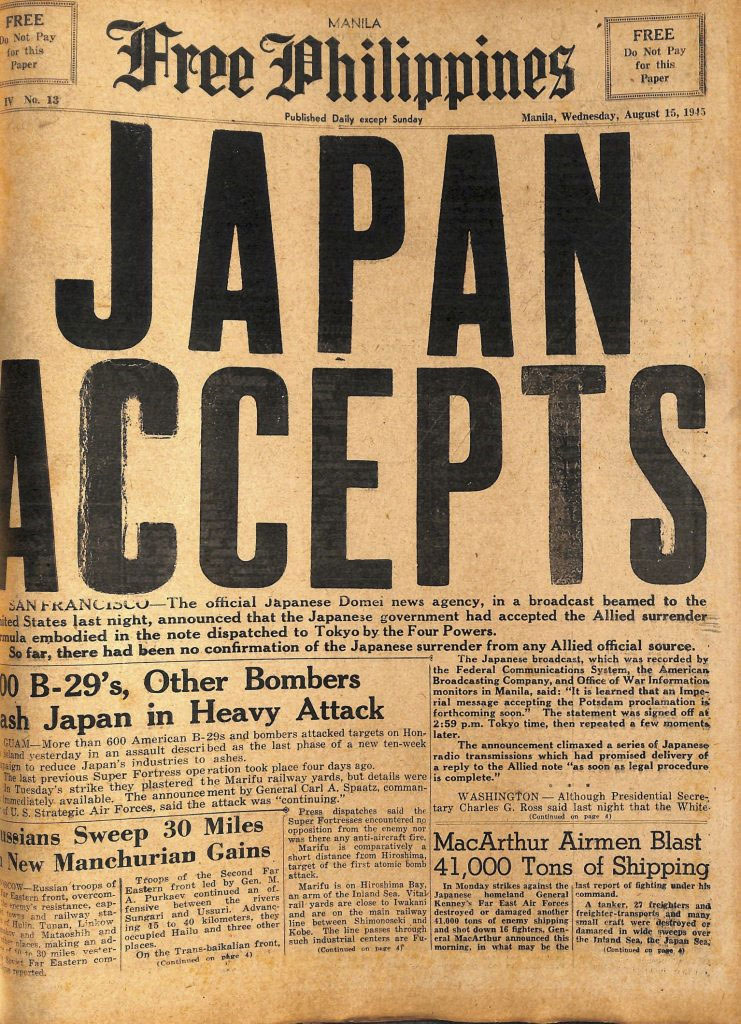
The 4th edition of the paper, particularly thrilling news for Filipinos:
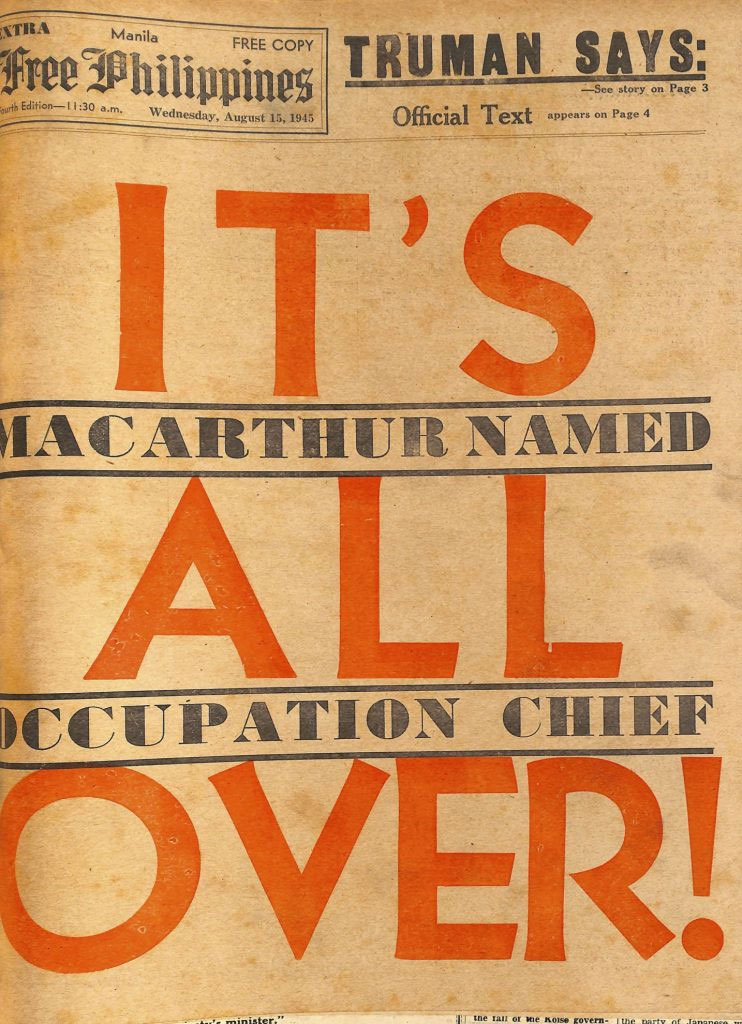
For Japan, it would be The Gyokuon-hoso or Jewel Voice Broadcast, of Emperor Showa, August 15, 1945, that would leave its indelible stamp on history:
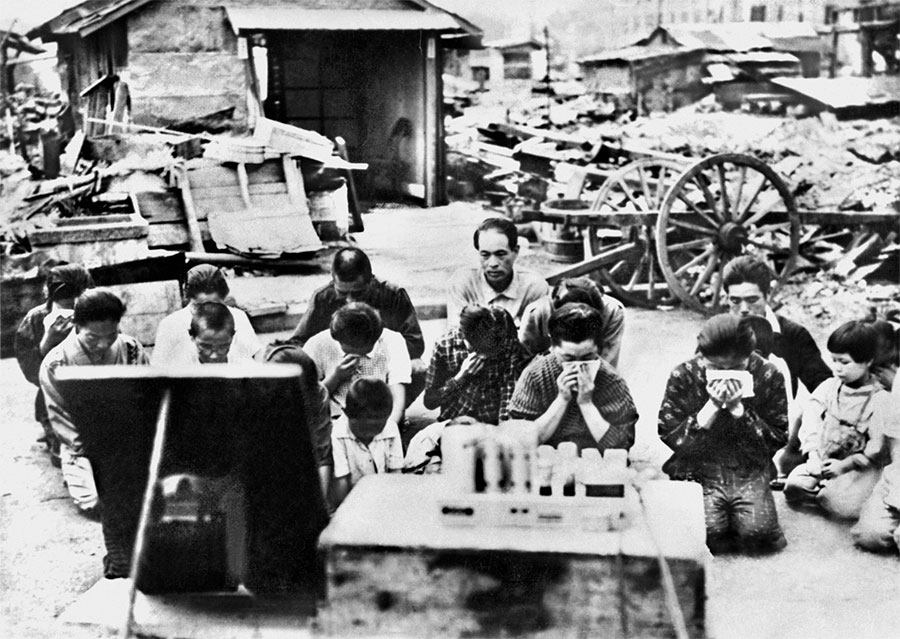
In Tokyo, Leon Ma. Guerrero listened to the historic broadcast of Emperor Hirohito and the immediate reactions of his subjects. A prologue, of sorts, as people heard a broadcast would be made and gathered around to hear it:
The war is over. At noon today the emperor personally broadcast his rescript proclaiming peace…
It was difficult to tell today from any other day. There were more people than usual in the tea lounge but they talked of every-day things. The maids and the waitresses shuffled along the corridors with unhurried pace. Their faces were drained of emotion and they averted their eyes. Somehow one did not feel like intruding into their thoughts.
The hotel radio was kept in the bird-room, behind the cashier’s little enclosure. Originally it had been a powerful American set encased in an ornate wooden cabinet. But sometime during the war the machine had been torn out, possibly to prevent anyone from listening to the forbidden shortwave, and now it rested, a tangle of tubes and wires, on a coffee table next to the disembowelled cabinet. It was now a very bad radio, connected by a complicated and clumsy network to a cheap round amplifier, but it was the only one in the hotel.
Around it now, in the neat little room with its three birdcages overlooking the ornamental fish-pond, the Japanese began to gather. The Germans, the Italians, the Thai, the Chinese, and the Burmans, kept to themselves in whispering groups along the corridor outside or, just beyond hearing distance, in the tea lounge and the lobby. But the Japanese crowded around the radio. The local chief of the military police was one of the first to arrive, a crop-haired, gold-toothed man with a Hitler moustache. He was not smiling now. The representative of the foreign office came next, tall, thin, and rabbit-faced. He did not speak to the kempei, although they were standing side by side at the foot of the stairs leading to the hotel theater.
Then, as noon drew near, the maids and the boy-sans and the waitresses, the cashier and her assistant, the reception clerks and the cooks, the embassy stenographers and interpreters, took their places around the wretched little mess of dull glass and steel which would soon enshrine the voice of the God-Emperor. In their stiff shy way they crowded upon each other; almost it seemed that they were huddling together for comfort, for some measure of assurance in the face of destiny.
There was complete silence as the clocks ticked toward noon. It was stifling. The windows had been closed to keep out the noise of the children playing by the pond outside. The waiting was oppressive and we watched the plump gleaming fish sliding smoothly against one another as they crowded obediently around the large black rock where the children stood, feeding them crumbs.
A Japanese woman married to an Italian tiptoed in. She was leading her two-year-old son by the hand. He was inclined to be difficult and to amuse him she showed him how to play with the song-birds caged beside the window. There was a smell elevator attached to the side of the cage and one placed a tender leaf or a pinch of golden seed in the straw basket at the end of the string.
Then the birds would hop to a tiny platform, thrust their delicate beaks through the bamboo bars, and pull the basket up.
A nine-year-old Italian boy sidled in, a tough bright youngster. A few days ago his mother had quarreled with the wife of another Italian, a New Yorker. The New Yorker’s husband had promptly smashed the other husband in the face, sending him to bed for a week. I wondered vaguely how the boy felt about his father now.
The radio was crackling and in sympathy there was a shuffling of slippers, a rustle of silk. A high-frequency note pierced through the furry undertones of static, held itself tinnily, faded, and then rose to the precise point of the exact time. Set your watches, ladies and gentlemen; mark the time, all ye good and loyal subjects, ye wrinkled horny-handed farmers with your foreheads on the straw mats, ye pale and bloated maidens in the baggy trousers, all ye stalwarts with the merry blossom on your backs, ye flea-bitten sore-scratching children playing with the empty shell case, ye tear-less widows by the wooden boxes from the far frontiers of war, ye scowling, weeping, breast beating warlords and sealords, mark the time; mark the time and wake, all ye miserable and wretched, ye bristly red-eyed welders, sleeping on each other’s shoulders; ye wan distracted mothers, bent with the equalling babies on your backs, dozing in the ration lines; mark the time, all ye good, loyal, bullied, cheated, gagged and handcuffed, starved, ragged, grateful subjects, mark the time. It is midnight at noon.
And then, the historic broadcast and the reactions of the Japanese hearing their emperor’s voice for the first time:
The Kimigayo stole in after the whispered awe of the announcer; it had never sounded so significant and fitting. It was a band playing and the words were not sung:
Thousands of years of happy reign be thine;
Rule on, my lord, till what are pebbles now
By age united to mighty rocks shall grow
Whose venerable sides the moss doth line.
But the music might have been written for this hour of defeat; some dark foreboding in the heart of the ancient and forgotten troubadour who, a thousand years ago, had sung it for a German band-master to adapt, had haunted the simple melody with plaintive lamentation, with a grave and solemn anguish over the vanquished dead.
It was a perfect prelude to the voice of the emperor which came through now without an introduction. It was a calm and deliberate voice, a little distant, with a trace of weariness. As the intricate cadences of the courtly phrases drifted through the room into the sunlit garden outside, I looked around me covertly. It was the first time that the Japanese had heard their “Manifest god”. All were expressionless as they stood, stiffly upright, their hands at their sides with the palms turned backward, head and shoulders bent low with reverence. Not a sound came from them. Perhaps it was blasphemy to weep.
When the rescript had been read, a younger more vigorous voice came through. It was the old Premier Admiral Baron, explaining the circumstances that had led to the surrender, the long wreck-strewn burning road that had led to the ruin of the empire. Then it was, and only then, that the Japanese wept. But they wept quietly, the sobs of the women were muffled in their sleeves, and the tears of the men ran undried along their pale cheeks. Somehow it was painful even for a stranger, painful even to hear the Italians and the Germans outside in the corridors, debating heatedly whether the rescript had proclaimed peace or resistance to the death.
The broadcast was finished at a quarter to one. The Japanese went away silently, moving with bowed heads and reddened eyes through the clumps of foreigners already planning how they would rush home. It was incredible how swiftly normality, or at least the air of normality, was restored; indeed it had scarcely been disturbed. Lunch was a little late but it was served without a hitch.
And more reactions, as news sank in:
In the afternoon I decided to go to Tokyo. I felt I had to see whether the Japanese had taken the end of their world with similar serenity. Before taking my train I went outdoors for a swim. The pool was deserted except for four Japanese boys frolicking noisily in the water. They kept to themselves but they did not seem depressed. Perhaps they had not yet heard. But outside in the
village it was the same. A group of school-girls in pigtails were skipping rope outside the hotel. A military policeman was feeding his carrier-pigeons. The crowd waiting for the electric tram had its usual air of preoccupation with bundles and tickets and seats.The train to Tokyo was an hour late. As I waited on the platform at Odawara two Japanese came up and spoke to me. It was the first tangible proof I had the the war was really over. One of them was a slatternly woman, dirty, unkempt, loose-mouthed, shifty-eyed. She asked me where she could get some medicine for her sick baby. when I said I did not know, she lingered a while and then, laughing, jumped down from the platform, and drank rapidly from a public fountain.
The other was a quiet—spoken man in a frayed national uniform. He squatted beside me and, while he unrolled his gaiters with a calm decisive hand, asked what nationality I was. Then he offered me some pipe-tobacco which he extracted from a smudged and much-folded envelope.
I refused politely.
“It’s excellent tobacco,” he offered it a second time.
When I refused again, he nodded briefly. He put the package away and then added in an impressive reproving tone: “It was American tobacco, you know.”
The train was packed to the windows with tired silent people and their huge bundles of black-market sweet potatoes, fruit, rice, two or three fish. If anything the atmosphere seemed less tense than usual. There were no longer any raids or strafing attacks to be feared. The lights were going on in the stations and in the countryside as we went by. In almost every official building there were also small bonfires, papers that were being burned before the Americans entered.
But nobody talked about war or peace. could it have happened in any other country in the world? Till yesterday, till even noon this day, they had believed, with a faith beyond all doubt, that in this holy war of theirs there could be no surrender, and that without surrender, there could be no defeat. Now the imperial rescript might speak obliquely of “a settlement of the present situation by an extraordinary measure”, of a war situation developing “not necessarily to Japan’s advantage”, of a benevolent solicitude for “innocent lives” and “human civilization”. But not the most polished and elegant circumlocutions could hide the fact of defeat, the “unendurable”, the “insufferable”.
What were now the “inmost feelings” of these good and loyal subjects? The unconquerable was conquered; the divine laid low. In the innermost recesses of the racial memory, no equal could be found for this “dictate of time and fate”. Not even when Hideyoshi’s armies staggered back to the shores of Korea to find their fleets swept from the sea by the “turtle-shell craft“ of Admiral Yi Sun-sin, had the imperial land suffered such a crushing defeat. For this was no momentary reverse, the abandonment of a conquered province, but total and complete defeat, submission of the imperial land itself to the conquering invader. No wind had risen from.the shrines at Ise and Togo lay mouldering in his grave.
For this the young men had frozen on the Manchurian tundra and vanished without a trace in the tall kaoliang; for this the young men had dragged themselves across the yellow plains of China, eaten the Weeds and the snakes of the jungle, burned on the lonely seas, dived to their death through flaming skies; for this they had sechemed, robbed, lied, intrigued and tortured; what a horrible price of shame, degradation, and self-pollution for this, this bowlful of brown rice mixed with the husks of beans, mulberry leaves and cattle fodder, this torn and grimy mompei and the paper shoes that fall apart in the rain, this acre of ashes, this hole in the earth, this night.
“Beware most strictly of any outbursts of emotion,” O ye good and loyal subjects. “Cultivate the ways of rectitude, foster nobility of spirit,” ye wretched of the earth. The men and women about me spoke softly of the price of pickled radish, an aunt in Hokkaido, an open window where the soot was coming in. A child equalled and when it did not stop the mother opened the top of her mompei and gave him her breast; it was a big child but her milk was cheaper than rice. A tired old man, with many apologies, sank on the strip of seat beside me and loosened the straps of the sack on his back. We were coming into Tokyo station now and a gnarled peasant woman cried: “How bright it is!”
But no one looked up. The passengers went hurriedly and silently along the platform to the exits, afraid, ashamed, of the light.
In Nara where the remnants of the Japanese-sponsored Second Republic of the Philippines lived in exile, Salvador H. Laurel recounted,
At 12 noon today, I heard the Japanese national anthem (Kimigayo) played several times. I thought this very unusual. We have been here for three months now but I never heard it played so often. Something serious must be happening, I wondered.
Maning [Laurel] suddenly came into my room with the news that Japan had just surrendered. The Emperor himself made the announcement over the radio. At last the war is over! Thank God! Now we can go home but when –how?
Today I wrote a poem entitled “Ode to Peace” I showed it to Papa and he liked it. He suggested I change the line “strife is love’s wife” to “strife is linked with life.” It sounds better. He told me to write more such poems.
The young Laurel, too, went for a stroll to observe the reactions of the Japanese to the surrender announement:
This afternoon, I walked alone through the streets of Nara to find out how the Japanese are taking their defeat. There were very few people in the streets. Those I saw in the shops merely looked down and bowed a little. The city was deathly quiet. Only the guttural chanting of men in their homes broke the eerie silence. Kuya Pepe [Jose B. Laurel Jr.] explained these were the men who were about to commit hara-kiri or seppuku. They cannot accept defeat. Japan had never been conquered in more than 2000 years. They do not want to witness the surrender of their country. Agonized chanting went on through the night. I could not sleep.
In remote Iwahig, Antonio de las Alas simply wrote,
9:20 a.m. News came that Hirohito signed the surrender document. War is ended.